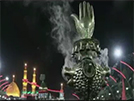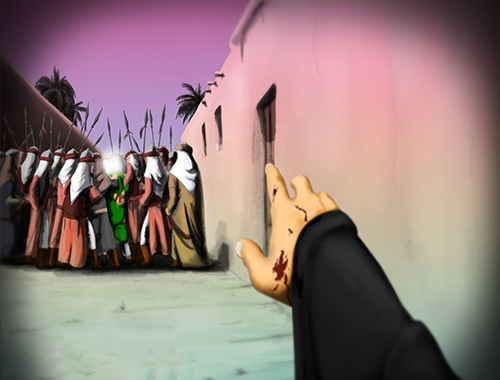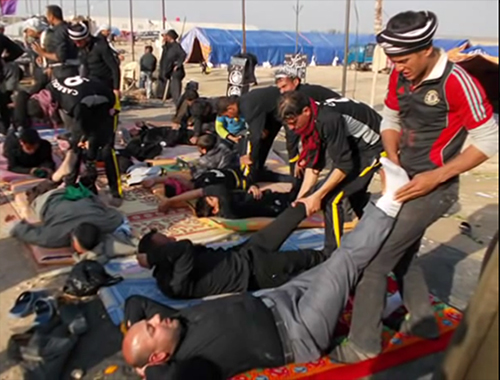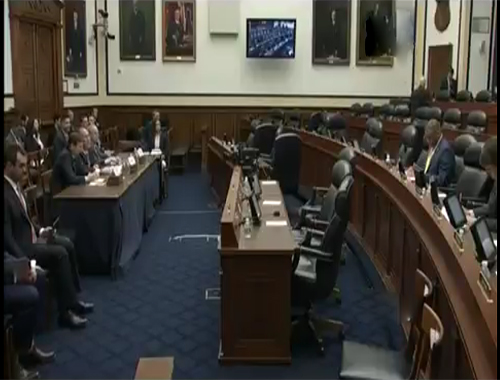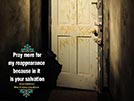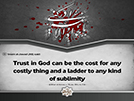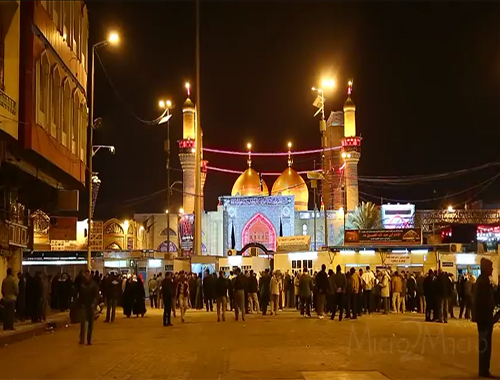Letter 82
- Details
- Hits: 6003
Letter 82
Consensus Was Not Concluded; Dissension Did Not Dissipate
Safar 30, 1330
Their consolidation in supporting al-Siddiq, and their providing him with counsel in secrecy and in public, is one thing; the validity of the consignment of the caliphate through consensus is quite another. They are not correlated judged by reason or tradition, for `Ali and all the infallible Imams from his descendants (as) have a well-known policy in supporting the Islamic authority; it is the same whereby we worship Allah. I mention it here in answer to what you have stated. It may be summed up thus: They believe that the Muslim nation can never rise to glory except through a state that unites its populace, mends any crack in its structure, protects its borders, and safeguards its undertakings. Such a state cannot be established except by subjects who support it with their lives and possessions. If it is possible for such a state to be led by a legitimate statesman who represents in the true sense of the word the government of the Messenger of Allah, then he is the one to be assigned for such a responsibility rather than anyone else. But if this becomes impossible, and the government is usurped by someone else, then the nation has to support him in every issue upon which the dignity and fortitude of Islam hinges, and so do the protection of the borders of the Islamic state, and the safeguarding of its national security.
It is not permissible to divide the Muslims or create discord among them by opposing him; rather, the nation has to treat him, albeit if he is a slave with amputated limbs, the treatment meted to rightful caliphs, entrusting him with the land's khiraj tax and his share thereof, the zakat of cattle and other items, etc. It has the right to take the same from him through the sale and purchase, as well as all means of property transfers, such as by way of awards, gifts, and the like.
There is no doubt about the clearing of conscience of one who pays him liabilities, as though he is paying them to the Imam of truth, and the rightful caliph. This is the path of `Ali and the purified Imams from his descendants (as). The Messenger of Allah (pbuh) has said: "There will be after me favouritism, and unpleasant matters," as stated in one hadith narrated by `Abdullah ibn Mas`ud which is quoted by Muslim on page 118, Vol. 2, of his Sahih, and by many authors of sahihs and sunan. People asked him (pbuh): "O Messenger of Allah! What do you enjoin one of us who witnesses them to do?" He (pbuh) answered: "Perform your obligations, and pray Allah for the attainment of what rightfully belongs to you." Abu Tharr al-Ghifari, may Allah be pleased with him, is also quoted by Muslim in Vol. 2 of his Sahih as saying, "My friend the Messenger of Allah (pbuh) advised me to listen and to obey even [a ruler who is] a slave whose limbs are amputated." Salamah al-Ju`fi is quoted by Muslim and others asking the Messenger of Allah (pbuh): "O Messenger of Allah! Suppose we are ruled by those who require us to discharge our duties towards them while they themselves decline to grant us our rights, what do you advise us to do then?" He (pbuh) answered him saying, "Listen and obey, for they will bear the burden of their sins, and you will bear yours." In one particular hadith quoted by Muslim on page 120, Vol. 2, of his Sahih, which is narrated by all authors of books of traditions, Huthayfah al-Yemani, may Allah be pleased with him, quotes the Prophet (pbuh) saying: "There will be rulers after me who will neither guide according to my guidance, nor follow my Sunnah; and there will be among them men whose hearts are like those of the devils' clad in human form." Huthayfah asked him (pbuh): "What shall I do then, O Messenger of Allah, if I happen to witness that?" He (pbuh) answered: "You shall listen to the ruler and obey him; if he whips your back and confiscates your property, you will still have [no choice but] to listen and obey." Similar to this hadith is one narrated by Umm Salamah thus: "There will be [unjust] rulers over you, and you will either acknowledge [their being unjust] or deny it. Those who acknowledge shall be considered innocent, while those who deny it will be saved from chastisement."[1] They asked him (pbuh): "Are we not supposed to fight them?" He answered: "No, as long as they uphold their prayers."
Sahihs are consecutively reported in narrating the above quoted traditions, especially through the purified progeny (as). For this reason, the latter remained persevering as they saw eye-sores, and they kept tongue-tied, acting upon these sacred commandments and upon others whereby they were bound. They were enjoined to persevere while suffering as they felt forced to overlook eye-sores, safeguarding the unity of the nation, and keeping it intact. They abided by the gist of these texts while dealing with those who were entrusted with faring with the affairs of the Muslims. While being aware of the fact that they themselves were more worthy of being in their shoes, they tasted the bitterness of colocynth, hoping they might be able one day to lead them to the Right Path. The ascension of those individuals to power was more painful to them than the blows of sharp swords, yet they tolerated it only to fulfill the covenant, discharge the commitment, and carry out their duties as far as the Shari`a is concerned, favouring - while opposing such rulers - to prefer what is most important over what is more important. For this reason, the Commander of the Faithful (as) tried his best to provide counsel to all three caliphs, exerting himself in providing them with advice.
Whoever acquaints himself with his policy during their epoch will come to know that he, having lost all hope to get his indisputable right to succeed the Messenger of Allah (pbuh), willingly took to reclusion, preferring to make asylum with those in authority. He did not fight them while seeing his promised throne in their grip, nor did he oppose them openly. He did so only in order to maintain the solidification of the nation and safeguard the creed, always keeping the religion's interest in mind, preferring the life hereafter to this one. He suffered from agonies which nobody else suffered. He was agonized by two calamities: the caliphate in its texts and commandments was earnestly pleading to him in a heart-rending voice on one hand, and, on the other hand, oppressive discord was warning him against a possible mutiny in the peninsula. There was a possible danger of bedouin Arabs renouncing their religion, thus annihilating the Islamic creed. The faith was being threatened by the hypocrites of Medina in whose nature hypocrisy was immersed, and who were aided by the hypocritical bedouins around them, according to the text of the Book (Qur'an). Nay, the latter party was even worse in disbelief and hypocrisy than the first, so much so that it was better they did not know the limits of what Allah had revealed to His Messenger (pbuh).
The loss of the Prophet (pbuh) emboldened the latter, and Muslims became in the aftermath like frightened cattle in a winter night, surrounded by wolves and ferocious brutes. While their fellows were quite active in their attempts to wipe out the religion of Islam and crush the Muslims, the Romans, the Kisras and others were waiting in anticipation, to the end of the list of such thronging elements that bore grudge against Muhammad, the progeny of Muhammad, and the companions of Muhammad (pbuh). These parties bore animosity towards and felt jealous of the message of Islam; they desired to demolish its foundations, and undermining its might. In such endeavour, they would be very quick, seeing that they had their golden opportunity in the departure of the Prophet to his Supreme Companion. The chance had ripened then for them to make use of the chaos before Islam had recovered its strength and organization. It was then that the Commander of the Faithful (as) realized both dangers, and it was only natural that he would sacrifice his own right in order to sustain the religion of Islam, thus preferring the general interest to that of his own.
This is how such confusion ended, and the dispute between him and Abu Bakr was suspended, for he dreaded nothing save the disunity of Muslims and was concerned only that the Muslims should have the upper hand. So, he, all members of his household, their supporters from the Immigrants and Ansar, remained patiently tongue-tied even as they saw eye-sores. His speech after the Messenger of Allah (pbuh) had departed is very frank in reflecting this attitude, and relevant reports are consecutive through the Imams of the purified progeny.
But the head of the Ansar, Sa`d ibn `Abadah, never made asylum with the first two caliphs, and he was never seen in public accompanying either of them during an `Id celebration or on a Friday, and he never subscribed to their views, nor did he ever yield to their orders, till he was assassinated in Huran during the reign of the second caliph, and his assassins claimed that he was killed by the jinns. He made a memorable statement during the saqifa incident, but we see no need to quote it here.[2]
As regarding his friends such as Haban ibn al-Munthir[3] and other Ansaris, these succumbed unwillingly, yielding to pressure; so, do you consider the actions dictated by the fear of the sword or the burning by the fire[4] as a belief in the consignment of the allegiance? Or is it a testimony to such "consensus" implied in the statement of the Prophet (pbuh) saying "My nation shall never commit an error in its consensus of opinion"? Please state your verdict; may Allah reward you, Wassalam.
Sincerely,
Sh
-----------------------------------
[1] This hadith is quoted by Muslim on page 122, Vol. 2, of his Sahih. The meaning of his phrase (pbuh) "Whoever knows it is innocent" is that whoever knew the abomination and identifies it as such will have a path leading to dissociation from its sin and punishment by changing it with his own hand or tongue, but if he cannot, then let him abhor it by his heart.
[2] Sa`d ibn `Abadah, Thabit's father, was one of those present at the taking of the allegiance at `Aqaba. He is also a participant in Badr and other battles. He was chief of al-Khazraj and their envoy, a generous man and a chief among the Ansar. His statement, to which we have referred, fills books of biographies and histories. Suffices you what Ibn Qutaybah has said in his treatise on Imamate and politics, Ibn Jarir al-Tabari in his Tarikh, Ibn al-Athir in his Al-Kamil, Abu Bakr Ahmed ibn `Abdul-`Aiz al-Jawhari in his book Al-Saqifa, and others.
[3] Habab was one of the chiefs of the Ansar and a hero of Badr and Uhud, a man of feats and a glorious record. He is the one who said: "I am [as strong and firm as] a wooden post rubbed by camels, and a sweet fruit very much coveted. I am the son of a lion in his own den; by Allah, if you so desire, we would go back to wage a war that would grind even youngsters." He said other much stronger statements, and we thought it would be wiser to refrain from quoting them here.
[4] Their threat to `Ali to burn his house is proven by absolute tawatur. Consider what Imam Ibn Qutaybah has said at the beginning of his chapter on Imamate and politics, Imam al-Tabari in two places where he discusses the events of the year 11 A.H. in his famous Tarikh, Ibn `Abd Rabbih al-Maliki in his hadith of the saqifa as quoted in Vol. 1, page 134, of Sharh Nahjul Balaghah] by al-Hamidi al-Hadidi, al-Mas`udi in Muruj al-Thahab quoting `Urwah ibn al-Zubayr when the latter apologized on behalf of his brother `Abdullah who almost started setting the houses of the descendants of Hashim on fire because they boycotted his allegiance, al-Shahristani who quotes al-Nizam while discussing the Nizami group in his book Al-Milal wal-Nihal. Abu Mikhnaf has dedicated for the narratives related to the saqifa an entire book in which he details what we have summarized here, not to mention the fame and tawatur of this hadith, in addition to these poetic verses by al-Hafiz Ibrahim which are famous as the "`Umeri poem":
A statement `Umer said to `Ali; so think for a while;
Its listener venerate, respect the speaker and bear:
"Shall I burn your house and make of its ashes a pile
Should you choose to be stubborn and not swear
The oath of allegiance, even if and while
The Chosen One's daughter is inside there?"
None other than Abu Hafs was the speaker
Addressing Adnan's knight and protector...
Thus did they treat the Imam (as) without whose agreement, consensus according to our view can never be binding; so, we ask all those who are fair-minded how can their "consensus" be binding upon us, since the case is as such?

